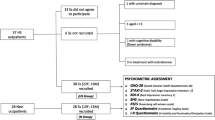Abstract
Introduction
Anger plays a major role in psychodermatological diseases. Researchers have reported that anger and other psychological factors play a role in the etiology of chronic urticaria. This study aimed to examine symptoms of anger, anger-related behavioral patterns, thoughts associated with anger, situations that cause anger and experiences of interpersonal anger in patients with chronic spontaneous urticaria (CSU). The authors hypothesized that patients with CSU react to more situations with anger and experience more anger symptoms as compared to alopecia areata (AA) patients and healthy controls.
Methods
The cohort study population consisted of literate adult patients aged <65 years that were diagnosed with CSU at the outpatient dermatology clinics of Başkent and Gazi University, Ankara, Turkey, between September 2011 and October 2012. The first control group included individuals without any physical or mental disorders and the second one included literate adult patients diagnosed with AA. The patients and controls were matched according to age, gender, and level of education. A sociodemographic data form, and the Hospital Anxiety and Depression Scale and Multi-Dimensional Anger Inventory were administered to the participants. Data were analyzed using SPSS v.17.0 for Windows. The primary outcome was to determine whether there was a relationship between anger and CSU.
Results
The CSU group consisted of 30 participants; AA group consisted of 30 participants; and the healthy group consisted of 39 participants. Anxiety and depression scores in the CSU group were significantly higher than those in the healthy control group. Symptoms of anger, situations that cause anger, and thoughts associated with anger were significantly more common in the CSU group compared to AA group and healthy group.
Conclusion
More of the CSU patients were observed to respond with excessive anger to most situations, to have high levels of anxiety anger and passive aggressive interpersonal relationships.
Similar content being viewed by others
References
Koh KB. Anger and somatization. J Psychosom Res. 2003;55(2):113.
Liu L, Cohen S, Schulz MS, Waldinger RJ. Sources of somatization: exploring the roles of insecurity in relationships and styles of anger experience and expression. Soc Sci Med. 2011;73(9):1436–43.
Barbosa F, Freitas J, Barbosa A. Chronic idiopathic urticaria and anxiety symptoms. J Health Psychol. 2011;16(7):1038–47.
Gupta MA, Gupta AK, Schork NJ, Ellis CN. Depression modulates pruritus perception: a study of pruritus in psoriasis, atopic dermatitis, and chronic idiopathic urticaria. Psychosom Med. 1994;56(1):36–40.
Shoemaker RJ, Levine MI, Shipman WG, Mally MA. A search for the affective determinants of chronic urticaria. Am J Psychiatry. 1962;119:358–9.
Staubach P, Dechene M, Metz M, Magerl M, Siebenhaar F, Weller K, et al. High prevalence of mental disorders and emotional distress in patients with chronic spontaneous urticaria. Acta Derm-Venereol. 2011;91(5):557–61.
Balkaya F, NH Ş. Çok Boyutlu Öfke Ölçeği. Türk Psikiyatri Dergisi. 2003;14(3):192–202.
Zigmond AS, Snaith RP. The hospital anxiety and depression scale. Acta Psychiatr Scand. 1983;67(6):361–70.
Aydemir Ö. Hastane Anksiyete ve Depresyon Ölçeği Türkçe Formunun Geçerlilik ve Güvenilirlik Çalışması. Türk Psikiyatri Dergisi. 1997;8(4):280–7.
Sperber J, Shaw J, Bruce S. Psychological components and the role of adjunct interventions in chronic idiopathic urticaria. Psychother Psychosom. 1989;51(3):135–41.
Topal İO, Altunay İK, Mercan S. Kronik Ürtikerli Hastalarda Kişilik Bozuklukları. Anksiyete ve Depresyo. Klinik Psikiyatri Dergisi. 2004;7(4):199–209.
Preston K. Depression and skin diseases. Med J Aust. 1969;1(7):326–9.
De Gucht V, Maes S. Explaining medically unexplained symptoms: toward a multidimensional, theory-based approach to somatization. J Psychosom Res. 2006;60(4):349–52.
De Gucht V, Fischler B. Somatization: a critical review of conceptual and methodological issues. Psychosomatics. 2002;43(1):1–9.
Lindemayr H, Gathmann P, Cermak T, Grunberger J. Is chronic recurrent urticaria a psychosomatic disease? Zeitschrift fur Hautkrankheiten. 1981;56(1):28–40.
Papadopoulos L, Walker C. Psychodermatology: the psychological impact of skin disorders. Cambridge: Cambridge University Press; 2005. p. xii, 158.
Dryden W. Dealing with anger problems: rational-emotive therapeutic interventions. Sarasota, FL: Professional Resource Exchange; 1990.
Kellner R, Hernandez J, Pathak D. Self-rated inhibited anger, somatization and depression. Psychother Psychosom. 1992;57(3):102–7.
Broom BC. A reappraisal of the role of ‘mindbody’ factors in chronic urticaria. Postgrad Med J. 1016;2010(86):365–70.
Jafferany M. Psychodermatology: a guide to understanding common psychocutaneous disorders. Prim Care Comp J Clin Psychiatry. 2007;9(3):203–13.
Lipowski ZJ, Lipsitt DR, Whybrow PC. Psychosomatic medicine: current trends and clinical applications. New York: Oxford University Press; 1977. p. xix, 625.
Koh KB, Kim DK, Kim SY, Park JK, Han M. The relation between anger management style, mood and somatic symptoms in anxiety disorders and somatoform disorders. Psychiatry Res. 2008;160(3):372–9.
Acknowledgments
All named authors meet the ICMJE criteria for authorship for this manuscript, take responsibility for the integrity of the work as a whole, and have given final approval for the version to be published. The authors thank Behçet Coşar (data collection), Yusuf Sevim (translation) and Ersin Öğüş (data analysis) for their support. No funding or sponsorship was received for this study or publication of this article.
Conflict of interest
Ali Ercan Altinöz, Nilgün Taşkintuna, Şengül Tosun Altinöz and Selvi Ceran have no conflict of interest to disclose.
Compliance with ethics guidelines
All procedures followed were in accordance with the ethical standards of the responsible committee on human experimentation (institutional and national) and with the Helsinki Declaration of 1975, as revised in 2000 and 2008. Informed consent was obtained from all patients for being included in the study.
Author information
Authors and Affiliations
Corresponding author
Electronic supplementary material
Below is the link to the electronic supplementary material.
Rights and permissions
About this article
Cite this article
Altınöz, A.E., Taşkıntuna, N., Altınöz, Ş.T. et al. A Cohort Study of the Relationship Between Anger and Chronic Spontaneous Urticaria. Adv Ther 31, 1000–1007 (2014). https://doi.org/10.1007/s12325-014-0152-6
Received:
Published:
Issue Date:
DOI: https://doi.org/10.1007/s12325-014-0152-6




